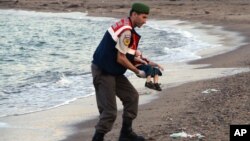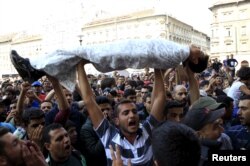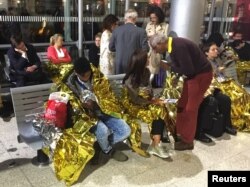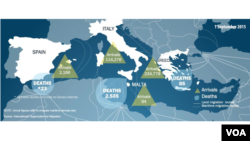Photographs of the body of a migrant Syrian toddler washed up on a Turkish beach were printed Wednesday in newspapers across Europe, and the baby instantly became the poster child for the continent's refugee crisis.
One picture showed the baby's lifeless body lying in the surf. Another showed a Turkish soldier carrying him away.
Turkish authorities believe the boy was one of 13 Syrian migrants who drowned Wednesday when two small boats heading from Turkey to the Greek island of Kos capsized.
Peter Bouckaert, emergencies director for New York-based Human Rights Watch, condemned what he called the "indifference and obstacles" that migrants in Europe were facing in their efforts to escape war and poverty.
"Some say the picture [of the dead child] is too offensive to share online or print in our newspapers," he said. "But what I find offensive is that drowned children are washing up on our shorelines when more could have been done to prevent their deaths."
Bouckaert called the parents of Syrian children "heroes" for trying to get them away from the fighting and terrorism.
Protests in Hungary
In Hungary, meanwhile, hundreds of migrants demanding free passage to Germany protested for a second day Wednesday at Budapest's main international train station.
Riot police outside the Keleti terminal pushed back the migrants, who were told they had to go to camps set up in Hungary. The migrants, denied access to the trains, shouted at police in Arabic and English, but the demonstration did not turn violent.
Europe is experiencing an unprecedented wave of refugees, with hundreds of thousands of people fleeing war and poverty for a better life in the European Union. Many of the migrants are from Syria, Afghanistan, Iraq, and Africa.
The 28-nation bloc has been struggling for months to handle the more than 332,000 migrants who have arrived this year.
The countries most affected — Greece, Italy and Hungary — have asked for more help. Germany, which is expecting to receive about 800,000 asylum seekers this year, has called on EU partners to share more of the burden by accepting larger numbers of migrants.
The foreign ministers of Italy, France and Germany signed a joint document Wednesday calling for a "strong response to the crisis" and for a review of current EU rules on granting asylum and a "fair" distribution of migrants within the EU.
The document says the migrant crisis has "clearly shown the limits and defects" of the rules on asylum and that they need to be reassessed.
This is one of Europe's biggest stream of migrants since World War II. The 28-member EU plans to hold emergency talks on the issue on September 14.
However, German police reported that only about 50 migrants arrived on the morning trains to Munich on Wednesday, compared with 2,400 on Tuesday.
Eurostar trains traveling between Britain and France were stopped for several hours overnight because of suspicions that illegal migrants were blocking the tracks.
Hundreds of passengers were frustrated and angry after Tuesday night's delays, which affected five Paris-to-London trains. Passengers complained that electricity and air conditioning were shut off while they waited.
The trains halted in front of the Eurotunnel, also known as the Chunnel, when officials raised the alert that migrants might be in the tunnel, or traveling atop the trains to cross from one country to another.
Boats capsize
Turkish media reports said 12 people drowned in the capsizing of the Kos-bound boats, including a woman and three children, while a 13th person died later in a hospital.
Greece's coast guard recovered the body of a man south of the island of Kalolimnos, but it was not clear whether that body was connected to the capsized Turkish boats about 22 kilometers to the northeast.
The Greek coast guard said it had rescued 1,058 people in 28 Aegean Sea locations over the past 24 hours.
More than 200,000 migrants have reached Greece this year, mainly from neighboring Turkey, where more than 1 million people from Syria, Iraq and Afghanistan live in refugee camps.
Police in northern Greece arrested six suspected smugglers after finding 103 migrants, including 19 children, hidden in a truck.
A spokesman for the U.N. refugee agency, Babar Baloch, told VOA, "All the countries have their own responsibility to deal with this crisis."









